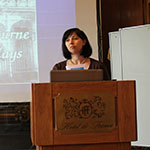Euroacademia Conferences
 Europe Inside-Out: Europe and Europeanness Exposed to Plural Observers (9th Edition) April 24 - 25, 2020
Europe Inside-Out: Europe and Europeanness Exposed to Plural Observers (9th Edition) April 24 - 25, 2020 Identities and Identifications: Politicized Uses of Collective Identities (9th Edition) June 12 - 13, 2020
Identities and Identifications: Politicized Uses of Collective Identities (9th Edition) June 12 - 13, 2020 8th Forum of Critical Studies: Asking Big Questions Again January 24 - 25, 2020
8th Forum of Critical Studies: Asking Big Questions Again January 24 - 25, 2020 Re-Inventing Eastern Europe (7th Edition) December 13 - 14, 2019
Re-Inventing Eastern Europe (7th Edition) December 13 - 14, 2019 The European Union and the Politicization of Europe (8th Edition) October 25 - 26, 2019
The European Union and the Politicization of Europe (8th Edition) October 25 - 26, 2019 Identities and Identifications: Politicized Uses of Collective Identities (8th Edition) June 28 - 29, 2019
Identities and Identifications: Politicized Uses of Collective Identities (8th Edition) June 28 - 29, 2019 The European Union and the Politicization of Europe (7th Edition) January 25 - 26, 2019
The European Union and the Politicization of Europe (7th Edition) January 25 - 26, 2019 7th Forum of Critical Studies: Asking Big Questions Again November 23 - 24, 2018
7th Forum of Critical Studies: Asking Big Questions Again November 23 - 24, 2018 Europe Inside-Out: Europe and Europeanness Exposed to Plural Observers (8th Edition) September 28 - 30, 2018
Europe Inside-Out: Europe and Europeanness Exposed to Plural Observers (8th Edition) September 28 - 30, 2018 Identities and Identifications: Politicized Uses of Collective Identities (7th Edition) June 14 - 15, 2018
Identities and Identifications: Politicized Uses of Collective Identities (7th Edition) June 14 - 15, 2018
Atypical Memoirs in English by Eastern European Female Writers
-
-

-
Presentation speakers
- Corina Crisu, University of Bucharest, Romania
- Download presentation
Abstract:
When I left Romania and came to live in the UK, they told me to look ahead; by no means to look back and become a pillar of salt. But how could I not become one – at the core of my being – when half of me was there? This invisible, crystallized carcass whose stillness envelops my soul has turned into my daily mirror. For those writers who live abroad, who have left their native land, willingly or unwillingly, displacement takes more than just a territorial or linguistic form. Perpetual border-crossers, they unfold their tales of migration more interested in charting their movements rather than fixing their boundaries, in how they are orientated rather than situated. An immigrant myself, I am continually driven towards the work of other Eastern Europeans who live in Anglophone countries and write in English as a second language. First-generation immigrants, these multilingual, transnational writers are a rare species: insiders/outsiders, they write about the Eastern and Western worlds after experiencing both of them, after drinking the bitter-sweet cup of both communism and capitalism. Eva Hoffman, Vesna Goldsworthy, and Irina Pana are but a few of the female immigrant writers whose literary border crossings and transnational appropriations I intertextually explore in my project. For them, assuming a borderland identity does not necessarily lead to existential dissolution, but to the reinforcement of both the native and adoptive selves. Reading them again and again, placing them under different theoretical lenses (cultural studies, philosophy, feminism, or postcolonial theory), I am struck by their emotional intensity, by their strength that results from “inhabiting one place and projecting the reality of another” (Seidel) – by their incurable nostalgia for their native land paralleled by their problematic acceptance of the new country. This double vision is reflected by their exquisite use of language: their English is infused with words from their languages, recreating the poignant flavours of their past so that longing could take the shape of the Romanian dor, the Polish teşknota, or the Serbian čežnja. In a dialectical movement from East to West, these female authors do not offer typical success stories in which they travel from the prison-like communist reality to the free Western world. Finding a place for their complex identities thus implies a multiple translation, from one territory to another, as well as from one language into another, in a continuous movement back and forth, inwardly and outwardly, on diachronic and synchronic lines.
-
Related Presentations

Czech Modernity As Secular Modernity
- Roman Vido

Christianity, Modernity and Romanian Folklore
- George Enache
















